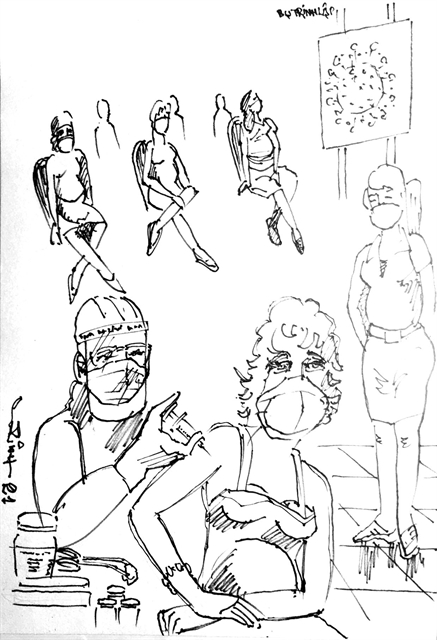 Talk Around Town
Talk Around Town

Over the past week, more than 1,000 pregnant women in Hà Nội have had their first shots

|
| Illustration by Trịnh Lập |
By Nguyễn Mỹ Hà
"When the eyes do not see, the heart wont' feel the pain!" were words spoken in a haunting documentary produced by director Tạ Quỳnh Tư, which aired on national television a few days ago.
"Ranh giới" (Boundary Records) shows harrowing moments inside Hùng Vương Hospital in Hồ Chí Minh City, where more than 300 pregnant women have been treated for COVID-19.
The documentary gives a look into the fierce battle that Hồ Chí Minh City, Bình Dương, Long An and other provinces have been fighting since the fourth coronavirus wave hit back in April.
News of the mortal toll has been announced everyday on national media, and Việt Nam has lost more than 15,000 people to the virus. For comparison, the total population of a city ward in Hà Nội like Cát Linh Ward is about 13,000 people, while Thanh Xuân Trung has more than 14,000 people.
What has been going on in the south goes beyond people’s imagination and when finally faced with it on their television screens, they found it difficult to bear.
"It's very traumatizing to watch," commented one viewer.
"The doctors, nurses and other medical staff have been working at 300 per cent of their capacity," wrote another. "My respect to all of them who worked on the frontline fighting COVID to win for women and their unborn kids."
Explaining his choice of location, director Tạ Quỳnh Tư said: "I knew this pandemic had taken away lives, but at the same time, new life was born. I imagine the fight to grasp a breath for coronavirus patients is hard, but it is twice as hard for expecting women."
Back in July, his team went into Hùng Vương Hospital and stayed for 21 days to film. The documentary is rough and shows harsh realities, such as a lack of oxygen at the hospital when demand suddenly shot up.
The battle goes down to each and every breath as pregnant women struggle for oxygen.
"Your oxygen level is very low, now try to inhale. Be strong! Inhale, if you want to see your kids, then inhale, now exhale," a nurse says at one point.
No matter how hard the doctors work and how much the women want to live, they sometimes lose the battle. Such moments were caught in the documentary, which proved astoundingly moving to viewers, but difficult for patient families and other pregnant women.
As Hà Nội, Hồ Chí Minh City and other provinces rush to vaccinate their populations, on one day a spectacular 1 million doses were administered.
"All expectant women fill out this online form to get vaccinated," reads an announcement at the National Hospital for Obstetrics and Gynaecology in Hà Nội. The hospital has given COVID shots only to pregnant women that have passed the 13-week timeline.
On August 18, the Ministry of Health issued a decision on temporary coronavirus treatment and prevention for pregnant women and unborn babies.
"For expecting women, until this moment, research shows that the possibility of transmitting SARS-CoV2 from mother to child via placenta during pregnancy is low," reads an announcement on Hà Nội City's Department of Health website.
"Studies in China and the US show that majority of sample tests from the amniotic fluid, umbilical cord blood, placenta, vulva fluid and mother's milk, pregnant women with coronavirus showed negative results for the SARS-CoV-2 virus. Almost all swab tests, taken from babies born from COVID-positive mothers were negative for the virus.
“The spread of the virus to newborns is believed to be from drops generated from caregivers with COVID-19."
A doctor, who declined to be named, said: "These vaccines are so new, and there have not been enough studies to recommend them for expecting women. You'll need to wait for recommendations from WHO or USFDA."
However the USFDA advice has been brief and vague when asked if pregnant or breastfeeding women can receive the Pfizer vaccine.
“While there have been no specific studies in these groups, there is no contraindication for receipt of the vaccine for pregnant or breastfeeding women. Pregnant or breastfeeding women should discuss potential benefits and risks of vaccination with their healthcare provider," the USFDA said.
The question referred only to the Pfizer vaccine, and the Hà Nội Health Department has advised pregnant women to take any vaccines available in the country, except for Spunik V.
It's tricky to decide whether to follow the department's call for vaccination when not enough studies have been made on the issue.
The decision now must be made by the pregnant women themselves, while their hormones are not at their usual level due to pregnancy. It is an important decision, not only for their own health, but also for that of their unborn children.
During a normal pregnancy, pregnant women need to have vaccinations against tetanus, Hepatitis B and seasonal flu, but it is not advisable for them for measles, mumps and rubella and some other diseases, according to general guidelines.
Over the past week, more than 1,000 pregnant women in Hà Nội have had their first shots.
"It's highly up to the ladies to decide whether they take the shot," says the above mentioned doctor. "If she can quarantine herself and those immediately around her until she gives birth, that's okay. But this is also very risky."
Some pregnant women who have had a vaccine reportedly told doctors that they did not want to be in the same position as those infected with COVID-19 at Hùng Vương Hospital as seen in the documentary.
At Hùng Vương Hospital, many children were born to mothers with COVID-19, and had to be separated at birth until their mothers recovered.
Many mothers could not see their babies until much later. Some could only see them via video calls with nurses or relatives, where nurses had fed them with baby formula, or the mothers had to relieve themselves of their milk. The situation is distressing for everyone involved.
A second related documentary "Ngày con chào đời", (The Day You Were Born) will air on September 22. VNS




